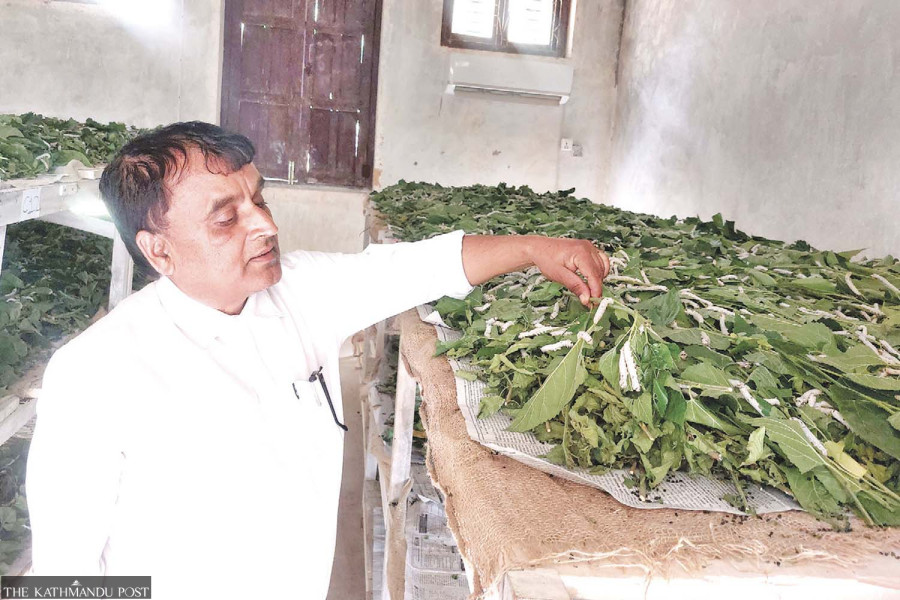Money
Tanahun silkworm farming mere tokenism as farmers lose interest
Environmental sensitivity, lack of proper infrastructure, and absence of a local market are key reasons behind farmers’ falling interest.
Samjhana Rasaili
Despite the high global demand and price for fabric made from silk thread, silkworm farming in Tanahun has been reduced to tokenism.
Farmers have stopped cultivating silkworms altogether.
Bhawanath Devkota, acting chief of the Centre for Industrial Entomology Development in Bandipur, said that although the silkworm business was once likened to “white gold”, it no longer attracts local farmers. Until 2022, some places in Gandaki Province engaged in commercial silkworm farming, but since then, the centre has been cultivating silkworms solely for seed preservation.
Devkota points to environmental sensitivity, lack of proper infrastructure, and absence of the local market as key reasons behind farmers' disinterest.
“Compared to other crops, silkworm farming is more sensitive. Even minor changes in environment and temperature and pollution can affect it: it requires special infrastructure,” he said. “But since such infrastructure has not been developed, farmers have started abandoning silkworm farming.”
According to him, farmers across Gandaki Province began quitting silkworm farming starting the fiscal year 2022-23.
He further said that the essential mulberry leaves (kimboo), which serve as silkworm feed, need to be grown on uncultivated or fallow land like hillsides and grasslands.
However, farmers were encouraged to plant kimboo in their existing fields, which disrupted the cultivation of staple food crops and made silkworm farming even more difficult. As a result, farmers gave up silkworms and returned to traditional farming.
Compared to vegetable, rice, or fruit production—where marketing and income are more reliable—silkworm farming failed to become as profitable.
Farmers ultimately cut down kimboo bushes and returned to vegetables, fruits and rice cultivation. “Until 2022, a few farmers here and there still practised silkworm farming,” Devkota said. “But now only this insect development centre does it, for the sake of demonstration.”
According to him, foreign tourists visiting Bandipur, school students, and domestic visitors occasionally come to observe silkworm farming.
Silkworm eggs are brought in from the Silk Development Centre, Khopasi, Kavre. These eggs are then incubated at around 27 to 28 degrees Celsius until the small worms hatch.
“Young worms are fed mulberry leaves. Within two to three days of hatching, they reach the third and fourth stages. It takes about 9 to 10 more days to reach the fifth stage,” he explains. “In the fifth stage, the worms begin to spin saliva to form cocoons, and the silk thread is extracted from these cocoons.”
A good cocoon can yield up to 800 metres of silk thread. After the cocoons are harvested in Khopasi, two parent breeds are mated to produce new eggs. These eggs are then distributed to commercial farmers in places like Dang, Itahari, and Biratnagar.
“Our centre has not been able to do anything beyond annual seed preservation,” Devkota says. Currently, the centre is cultivating around 120,000 eggs, from which it expects to produce about 90 kilograms of cocoons.
Although the environment allows for two silkworm farming seasons a year, Devkota believes that with appropriate infrastructure and a controlled environment, production could be extended to all four seasons.
The Commercial Insect Development Centre in Bandipur, which spans seven hectares, also engages in mushroom cultivation and beekeeping along with silkworm farming.
The centre, under the provincial government, serves 11 districts in Gandaki Province and supplies seeds to farmers engaged in commercial mushroom and beekeeping operations.
Although there are 10 sanctioned positions at the centre, only 9 are currently filled. “With a limited workforce, it is difficult to provide services to all districts,” said Devkota. “From the next year, we plan to focus services exclusively on Tanahun, tailoring farming practices to local needs and advancing the centre as a demonstration hub.”
The centre also aims to generate revenue by charging a small fee to visitors coming for educational tours.




 14.12°C Kathmandu
14.12°C Kathmandu













